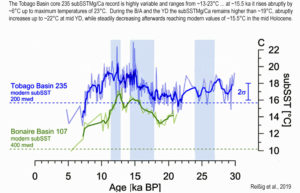by Northwestern University, May 9, 2019 in ScienceDaily
Discovery illuminates how bacteria turn methane gas into liquid methanol.
- Researchers have found that the enzyme responsible for the methane-methanol conversion in methanotrophic bacteria catalyzes the reaction at a site that contains just one copper ion. This finding could lead to newly designed, human-made catalysts that can convert methane — a highly potent greenhouse gas — to readily usable methanol with the same effortless mechanism.
- …
- The study will publish on Friday, May 10 in the journal Science. Rosenzweig is the Weinberg Family Distinguished Professor of Life Sciences in Northwestern’s Weinberg College of Arts and Sciences. Hoffman is the Charles E. and Emma H. Morrison Professor of Chemistry at Weinberg.
By oxidizing methane and converting it to methanol, methanotrophic bacteria (or “methanotrophs”) can pack a one-two punch. Not only are they removing a harmful greenhouse gas from the environment, they are also generating a readily usable, sustainable fuel for automobiles, electricity and more.
Current industrial processes to catalyze a methane-to-methanol reaction require tremendous pressure and extreme temperatures, reaching higher than 1,300 degrees Celsius. Methanotrophs, however, perform the reaction at room temperature and “for free”.
…
by Toby Young, May 9, 2019 in ClimateChangeDispatch
Anyone watching the BBC’s News at Ten on Monday would have been surprised to learn that economic growth poses a dire threat to the future of life on this planet.
We’re used to hearing this from climate change campaigners, but I’ve always taken such claims with a pinch of salt, suspecting that the anti-capitalist left is distorting the evidence. Apparently not.
‘One million species at risk of imminent extinction according to a major UN report,’ intoned the BBC. ‘It says the Earth’s ecosystems are being destroyed by the relentless pursuit of economic growth.’
So does this mean the Extinction Rebellion protestors are right?
I decided to do some digging to see if one million species really do ‘face extinction in the next few decades’, as the BBC put it.
That claim is based on a report by the UN’s Intergovernmental Science-Policy Platform on Biodiversity and Ecosystem Services (IPBES), but it hasn’t been published yet.
…

by K. Richard, May 9, 2019 in NoTricksZone
Another new paper published in Paleoceanography and Paleoclimatology casts further doubt on the paradigm that says CO2 has historically been a temperature driver.
Evidence from the tropical Atlantic indicates today’s regional temperatures (15.5°C) are 7.5°C colder than a peak temperatures (23°C) between 15,000 to 10,000 years ago, when CO2 hovered around 220 ppm.
…

by Anthony Watts, May 9, 2019 in ClimateChangeDispatch
That’s an indication of the personal bias of co-author Schmidt, who in the past has repeatedly maligned the UAH dataset and its authors because their findings didn’t agree with his own GISTEMP dataset.
In fact, Schmidt’s bias was so strong that when invited to appear on national television to discuss warming trends, in a fit of spite, he refused to appear at the same time as the co-author of the UAH dataset, Dr. Roy Spencer.
A breakdown of several climate datasets, appearing below in degrees centigrade per decade, indicates there are significant discrepancies in estimated climate trends:
- AIRS: +0.24 (from the 2019 Susskind et al. study)
- GISTEMP: +0.22
- ECMWF: +0.20
- RSS LT: +0.20
- Cowtan & Way: +0.19
- UAH LT: +0.18
- HadCRUT4: +0.17
Which climate dataset is the right one? Interestingly, the HadCRUT4 dataset, which is managed by a team in the United Kingdom, uses most of the same data GISTEMP uses from the National Oceanic and Atmospheric Administration’s Global Historical Climate Network.
…

La géologie, une science plus que passionnante … et diverse



